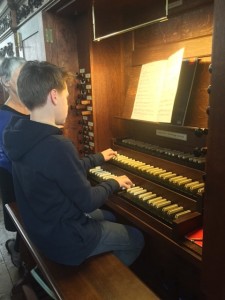So why are you an organist?
What attracted you to the organ in the first place? Who encouraged you and what motivated you to keep going?
How many of us have enough time for thorough and adequate preparation in learning repertoire and service music? Who will admit to muddling through as best as you can? And how many become frustrated by being unable to play as well as you would like? How do you set about learning a piece of music from the score?
It is possible that the first set of questions are easy to answer, and easy to be honest about. The second set concern part of the process of learning and it is all too easy to side step the honest answer in favour of one that is only partly true. One aspect of this is the gap between thinking that we are doing what the music says, and what actually happens if you find the courage to listen to yourself. Few people like the sound of their own voice and few like hearing themselves playing out of time, playing wrong notes, slipped notes, basically messing up. It is just so embarrassing. It is possible to do something about it.
We all love the sound of the organ for its power and wide range of exquisite sounds. It is possible that appreciating such beauty is overlooked because of the fascination with mechanical and architectural structures, of being regarded as clever to be able to play such a complex instrument. It is very easy to be absorbed by something that attracted you to the organ in the first place and to be unaware of how to learn. It is possible to do something about this too. In both cases, be honest and realistic about yourself, and seek a good teacher.
When it comes to performing, a different kind of coach is invaluable and it is worth seeking help from a performance coach to help with nerves. Performance Strategies for Musicians by David Buswell is available through Amazon, both as a book and in kindle form. It is highly recommended.
Marilyn Harper
*Photo used with permission


